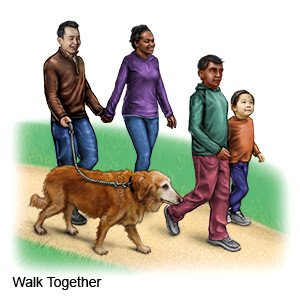Seasonal Affective Disorder
Medically reviewed by Drugs.com. Last updated on Aug 4, 2025.
AMBULATORY CARE:
Seasonal affective disorder (SAD)
is a type of depression that happens during a change of seasons. SAD usually happens during autumn and winter months when there is less sunlight because the days are shorter. This is called winter-onset depression. Symptoms usually go away in late spring or early summer. Episodes of SAD may be mild or severe.
Call your local emergency number (911 in the US) if:
- You have thoughts of harming or killing yourself.
Call your doctor if:
- You have new or worsening symptoms, even after treatment.
- You have questions or concerns about your condition or care.
Related medications
Other signs or symptoms you may have with SAD:
- A change in appetite, or a craving for carbohydrates
- Weight gain or loss without trying
- Less energy than usual, or oversleeping often
- Trouble concentrating or sleeping
- Feeling anxious, irritable, or hopeless
- Headaches or other pain
- Loss of interest in activities you usually enjoy, or not wanting to spend time with others
Treatment:
Your healthcare provider may recommend a combination of the following:
- Medicines may be given to improve your mood. You may also need medicine to prevent your body from producing melatonin. This medicine is only given if symptoms of SAD do not respond to other types of treatment.
- Talk therapy is used to help you talk about any negative feelings or depression you are feeling. You may also be able to learn how to prevent or manage SAD by talking about what worked in past years.
- Light therapy may include sitting in front of a light box or wearing a light visor for a certain amount of time each day. A light timer in your bedroom can turn lights up slowly. This may help you wake up more naturally than when you use an alarm clock. Do not use a tanning bed instead of a light box or visor. Tanning beds can cause serious skin damage.
Treatment options
The following list of medications are related to or used in the treatment of this condition.
Prevent or manage SAD:
- Be physically active, as directed. Physical activity, such as exercise, can help improve depression and energy levels.

- Eat a variety of healthy foods. Healthy foods include fruits, vegetables, lean meats, fish, whole-grain foods, and low-fat dairy products. Limit sugar and foods that contain simple carbohydrates, such as cookies and cake.

- Create a sleep routine. Sleep is important for emotional health. Ask your healthcare provider how much sleep you should aim to get each night. The amount depends on your age and general health. In general, school-aged children and teenagers need about 9 to 10 hours of sleep a night. Most adults need about 7 to 9 hours of sleep a night. You may need to create a schedule so you are awake during as many daylight hours as possible.
- Increase your exposure to light. Turn on lamps in your home. Go outside several times during the day. Even on cloudy days, you will be in helpful sunlight. If possible, visit areas that get more light than where you live.
- Manage stress. Stress can increase depression and make it harder to sleep.
- Do not drink alcohol or use illegal drugs. Alcohol and drugs can make depression worse. Ask your healthcare provider for more information if you need help quitting.
Follow up with your doctor as directed:
Write down your questions so you remember to ask them during your visits.
© Copyright Merative 2025 Information is for End User's use only and may not be sold, redistributed or otherwise used for commercial purposes.
The above information is an educational aid only. It is not intended as medical advice for individual conditions or treatments. Talk to your doctor, nurse or pharmacist before following any medical regimen to see if it is safe and effective for you.
Learn more about Seasonal Affective Disorder
Treatment options
Care guides
Further information
Always consult your healthcare provider to ensure the information displayed on this page applies to your personal circumstances.
